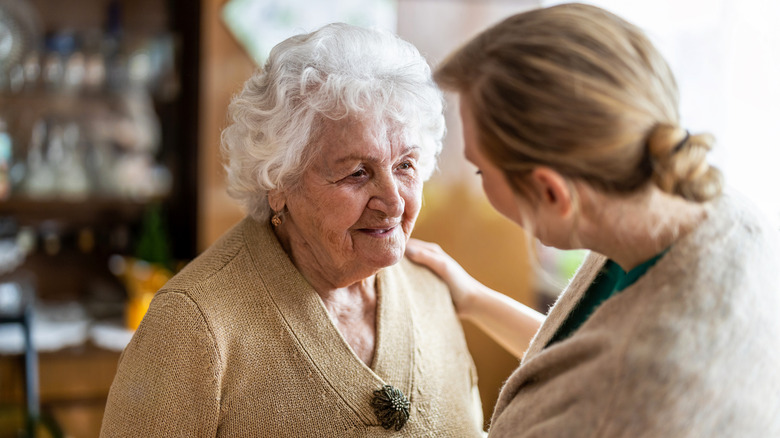What To Know About The Link Between Alzheimer's And COVID-19
If you are an elderly adult who contracted COVID-19, you may be more prone to developing Alzheimer's disease, according to a new study published in the Journal of Alzheimer's Disease.
Researchers analyzed the health records of over six million adults over the age of 65 between February 2020 and May 2021, who were not previously diagnosed with Alzheimer's. Participants were divided into two main cohorts — a COVID-19 cohort and a non-COVID-19 cohort. The results revealed that those who had been infected with COVID-19 had an increased risk of a new Alzheimer's diagnosis, compared to those in the non-COVID-19 cohort. The risk was found to be especially high for adults over 85 years old and for women across all age groups.
Dr. Pamela Davis, the study's co-author, told MedicalNewsToday that researchers were motivated to determine if there was a link between COVID-19 symptoms, such as inflammation — which could have a direct impact on the brain — and cognitive impairment. Dr. Davis previously conducted a study that revealed that people with dementia had a higher risk of contracting COVID-19. She noted that these two studies indicate a potential "bidirectional relationship" between Alzheimer's and COVID-19, meaning influences in a relationship between two entities travel in both directions.
While experts stop short of stating that COVID-19 causes Alzheimer's, they suspect that COVID-19 may exacerbate a process that is already in motion, per CNN.
This is how to reduce your risk of Alzheimer's disease
According to Alzheimer's Association, over six million Americans across all age groups currently have Alzheimer's, 12% of whom are over 65. By 2050, the number of Americans over 65 with Alzheimer's is projected to reach close to 13 million.
As the most common form of dementia, Alzheimer's is the seventh leading cause of death globally, per the World Health Organization (WHO). The condition is a progressive disease that can begin with mild memory loss and eventually lead to a disruption in a person's ability to function in daily life. Alzheimer's can make it difficult for people to manage ordinary tasks, such as handling money and remembering where they put things. Health experts believe a number of factors contribute to Alzheimer's, with the primary factor being age. Family history and changes in brain chemistry also play roles, per the Centers for Disease Control and Prevention.
While there is no cure for Alzheimer's, health experts say there are some things you can do that may help you prevent developing the disease. According to the National Health Service, actions you can take that could help reduce your risk include maintaining strong social ties, reading, volunteering, and engaging in group activities. Health experts believe there is a link between cardiovascular disease and Alzheimer's, so limiting habits such as smoking and consuming alcohol can also reduce your risk, per the NHS.


